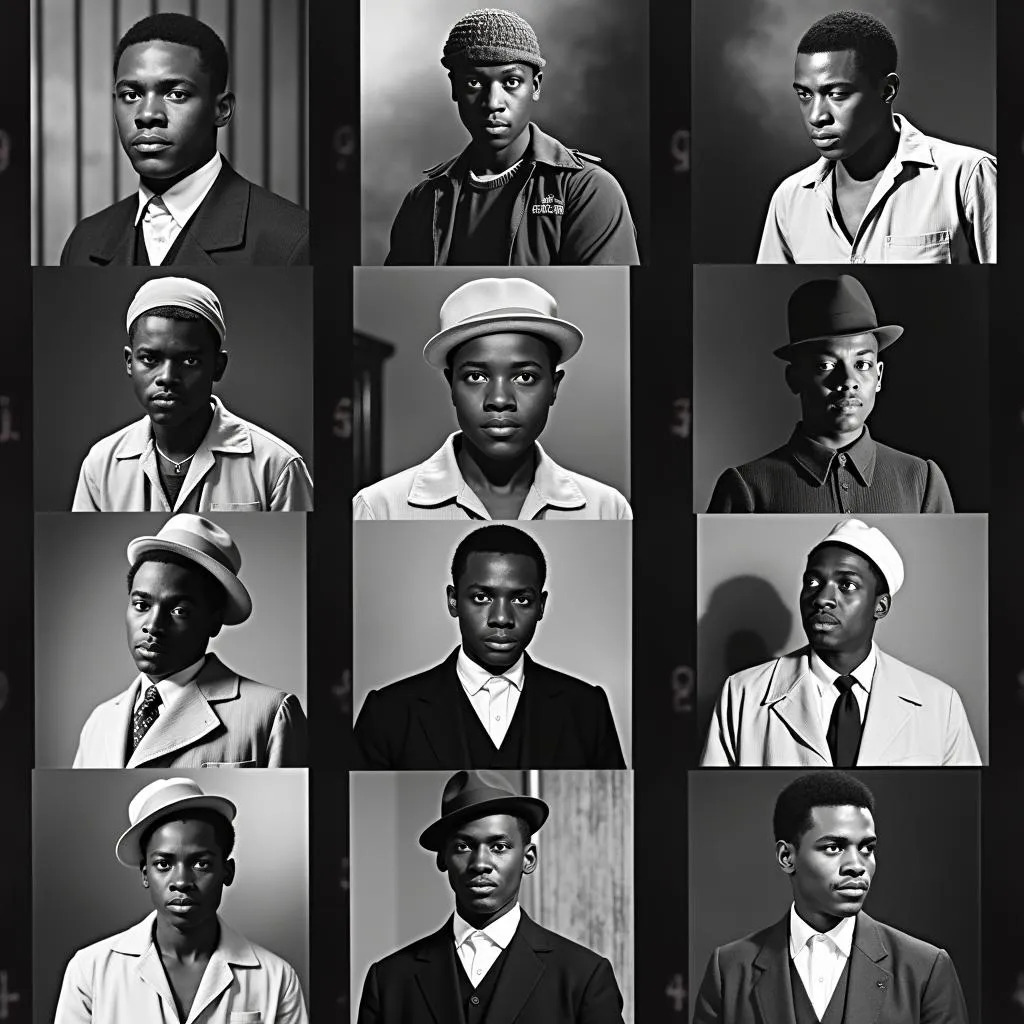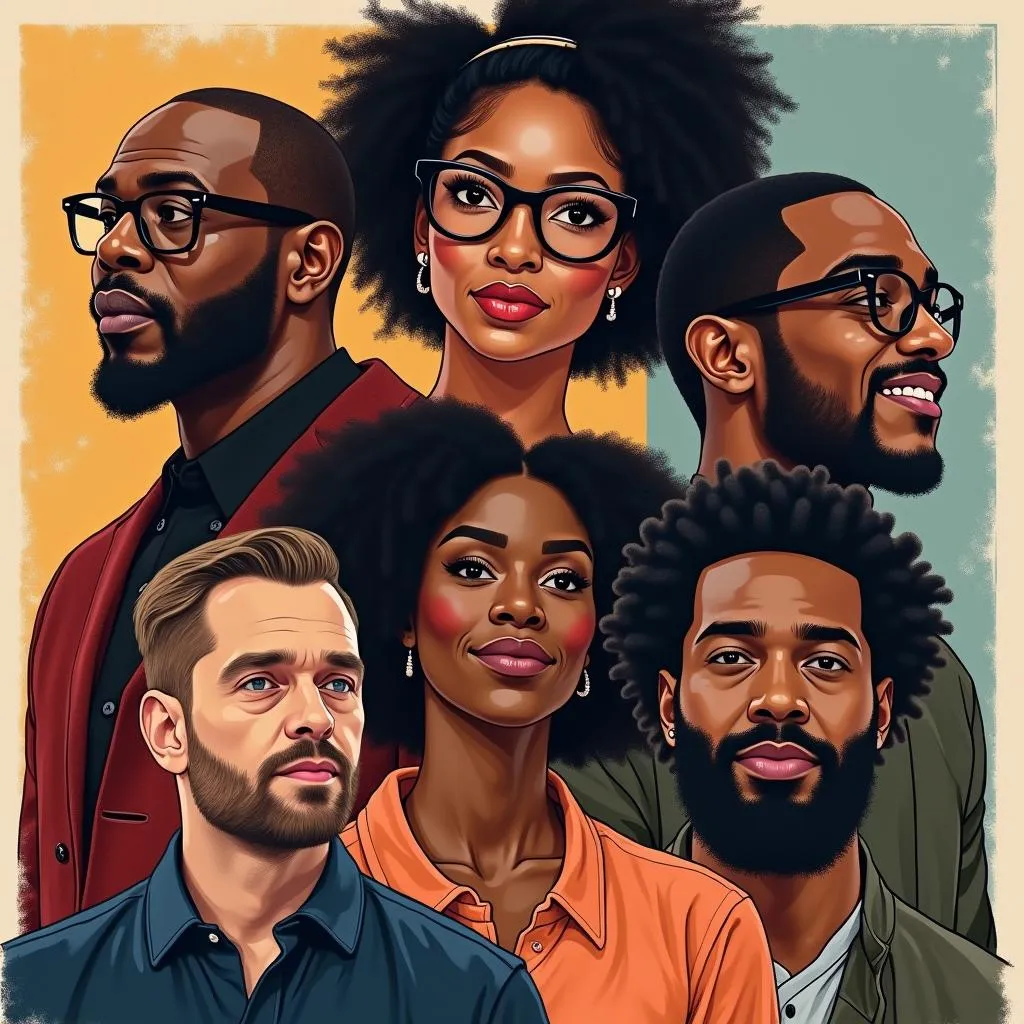African American Representation in Hollywood
African American Representation In Hollywood has been a topic of discussion for decades. From the early days of cinema to the present, Black actors and filmmakers have faced significant challenges in gaining recognition and opportunities within the industry. While progress has been made in recent years, there’s still a long way to go to achieve true equality and authentic representation.
A History of Struggle and Triumph: Examining the Evolution of Black Roles in Film
The history of African American representation in Hollywood is a complex and multifaceted one, marked by both progress and setbacks. In the early 20th century, Black characters were largely relegated to stereotypical roles, often portraying servants, slaves, or criminals. These portrayals perpetuated harmful stereotypes and reinforced racist ideologies.
 Early Black Stereotypes in Hollywood
Early Black Stereotypes in Hollywood
However, Black actors and filmmakers refused to be silenced. They began to challenge these stereotypes and create their own narratives. In the 1920s and 1930s, the Harlem Renaissance saw a surge in Black creativity, with films like “The Scar of Shame” (1926) and “Hallelujah!” (1929) offering more nuanced and complex portrayals of Black life.
During the Civil Rights Movement of the 1950s and 1960s, Black actors like Sidney Poitier, Harry Belafonte, and Dorothy Dandridge broke barriers and paved the way for future generations. Poitier’s historic Academy Award win for Best Actor in 1963 for his role in “Lilies of the Field” marked a turning point, signaling a growing acceptance of Black actors in leading roles.
The Rise of Black Filmmakers and the Emergence of New Voices
The late 20th century saw the emergence of a new wave of Black filmmakers, including Spike Lee, John Singleton, and Julie Dash, who brought fresh perspectives and authentic stories to the screen. Films like “Do the Right Thing” (1989), “Boyz n the Hood” (1991), and “Daughters of the Dust” (1991) explored themes of race, identity, and community, challenging Hollywood’s traditional narratives and offering a glimpse into the diverse experiences of Black America.
 Influential Black Filmmakers
Influential Black Filmmakers
The success of these films opened doors for even more Black talent, both in front of and behind the camera. The 1990s witnessed a boom in Black cinema, with films like “New Jack City” (1991), “Waiting to Exhale” (1995), and “Set It Off” (1996) finding both critical and commercial success.
The 21st Century and the Push for Inclusive Storytelling
In recent years, there has been a renewed focus on diversity and inclusion in Hollywood, with the #OscarsSoWhite movement shining a light on the lack of representation for people of color in the film industry. This movement has led to increased calls for more diverse casting, more opportunities for Black filmmakers, and a wider range of stories that reflect the experiences of all Americans.
Films like “Moonlight” (2016), “Get Out” (2017), “Black Panther” (2018), and “Us” (2019) have not only been critical and commercial successes but have also demonstrated the power of inclusive storytelling. These films have shattered box office records, resonated with audiences worldwide, and proven that stories about Black characters can be universally appealing.
Challenges and Opportunities: Navigating the Future of African American Representation
Despite the strides made, African American representation in Hollywood still faces challenges. Black actors continue to be underrepresented in leading roles, and Black filmmakers often struggle to secure funding and distribution for their projects. Stereotypes persist, and there is a need for more nuanced and complex portrayals of Black characters.
However, there is also reason for optimism. The growing demand for diverse content, the rise of streaming platforms, and the increasing influence of Black creatives within the industry are all creating new opportunities for African American representation.
Here are some ways to further improve African American representation in Hollywood:
- Support Black-led productions: Seek out and support films and television shows created by, directed by, and starring Black talent.
- Amplify Black voices: Share stories, reviews, and articles that highlight the work of Black creatives.
- Hold Hollywood accountable: Continue to call out instances of bias, discrimination, and lack of representation in the industry.
- Encourage diversity behind the scenes: Advocate for more diversity in writers’ rooms, production crews, and executive positions.
The future of African American representation in Hollywood is bright, but it requires a continued commitment from both the industry and audiences to create a more inclusive and equitable landscape for all.
Conclusion
The journey of African American representation in Hollywood has been long and arduous, marked by both triumphs and setbacks. While progress has been made, there is still work to be done to ensure that Black actors and filmmakers have the same opportunities and recognition as their white counterparts. By supporting Black-led productions, amplifying Black voices, holding Hollywood accountable, and encouraging diversity behind the scenes, we can help create a future where Black stories are told authentically and inclusively, reflecting the richness and complexity of the Black experience.
Don’t forget to check out these interesting articles about African culture:
- Affordable and stylish african american wigs cheap
- The fascinating african grey parrot personality
- Find the best products at your local african hair store
FAQ
-
What are some of the most influential Black films of all time? Some of the most influential Black films of all time include “The Birth of a Nation” (1915), “Gone with the Wind” (1939), “The Defiant Ones” (1958), “Guess Who’s Coming to Dinner” (1967), “Shaft” (1971), “Do the Right Thing” (1989), “Boyz n the Hood” (1991), “Malcolm X” (1992), “Waiting to Exhale” (1995), “Set It Off” (1996), “Love & Basketball” (2000), “Moonlight” (2016), “Get Out” (2017), “Black Panther” (2018), and “Us” (2019).
-
Who are some of the most iconic Black actors in Hollywood history? Some of the most iconic Black actors in Hollywood history include Sidney Poitier, Dorothy Dandridge, Harry Belafonte, Ossie Davis, Ruby Dee, Richard Roundtree, Pam Grier, Cicely Tyson, James Earl Jones, Whoopi Goldberg, Denzel Washington, Halle Berry, Morgan Freeman, Samuel L. Jackson, Angela Bassett, Viola Davis, Chadwick Boseman, and many more.
-
What are some of the challenges Black filmmakers face in Hollywood? Black filmmakers often face challenges such as securing funding, finding distribution, and overcoming stereotypes. They may also experience discrimination and bias within the industry.
-
How can I support Black representation in Hollywood? You can support Black representation in Hollywood by watching, reviewing, and promoting Black films and television shows, supporting Black-owned businesses, and advocating for diversity and inclusion in the industry.
-
What is the significance of the #OscarsSoWhite movement? The #OscarsSoWhite movement, which began in 2015, highlighted the lack of diversity and representation for people of color in the Academy Awards. The movement has led to increased awareness and calls for change within the film industry.
Need further assistance?
Contact us at:
- Phone Number: +255768904061
- Email: [email protected]
- Address: Mbarali DC Mawindi, Kangaga, Tanzania.
We have a 24/7 customer service team ready to help!
